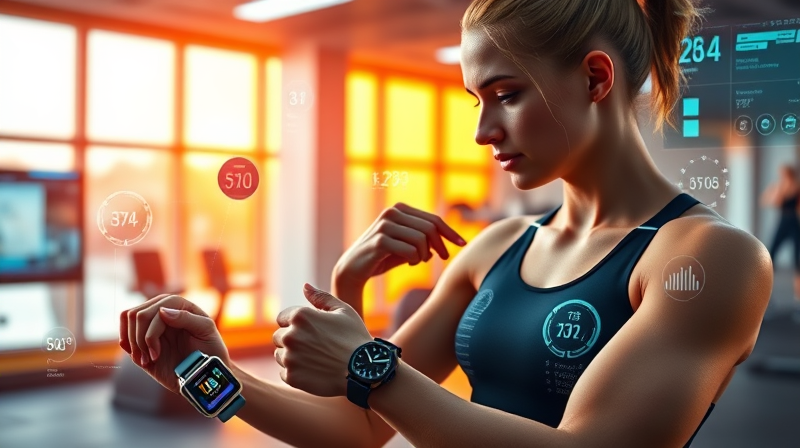In today’s digital age, the way we perceive health and fitness has significantly transformed. Apps and wearable devices have become an integral part of our lives by providing immediate and actionable insights into our physical progress. As technology continues to evolve, tracking your health, setting goals, and monitoring improvements have never been more accessible and personalized.
The surge in wearable technology means that whether you are a beginner stepping into the world of fitness or a seasoned athlete aiming to fine-tune your performance, there is a device designed just for you. These devices offer a variety of metrics ranging from basic step counts to advanced analytics like heart rate variability and recovery trends.
The Role of Modern Wearables in Fitness
Wearable devices have revolutionized the concept of fitness tracking. From the versatility of smartwatch technology to the discreet charm of smart rings, there is a wearable that seamlessly fits into your lifestyle:
- Fitness Watches (Smartwatches): Devices such as the Apple Watch, Garmin Forerunner, and Samsung Galaxy Watch are popular for their multifunctionality. They do more than track steps – they provide comprehensive data including heart rate, GPS navigation, calorie counts, and even advanced performance metrics like heart rate variability. Their ability to integrate with various apps and even complete daily tasks like notifications adds to their appeal.
- Fitness Rings: With minimalistic designs, fitness rings like the Oura Ring focus on offering detailed insights into sleep quality, stress management, and daily readiness. Their compact form factor and unobstructive wearability make them ideal for users who desire an unobtrusive tracking experience.
- Smart Clothing: Imagine clothing that works as hard as you do. With sensor-embedded fabrics, smart clothing such as yoga pants and specialized sportswear offer feedback on muscle engagement, posture, and movement efficiency. This innovation helps users perfect their form while keeping track of incremental improvements.
- Chest Straps and Armbands: For those who demand precision, chest straps and armbands offer incredibly accurate heart rate measurements. Some of these devices, like the Fourth Frontier X2 chest strap, even come with ECG tracking capabilities, providing a deeper insight into your cardiovascular wellness during high-intensity training sessions.
By harnessing these devices, users can build a more comprehensive picture of their physical well-being. The key is understanding that every piece of data collected translates into an opportunity to improve and refine your fitness regimen.
Tracking the Metrics That Matter
Data-driven insights are the cornerstone of modern fitness tracking. With so many metrics available, selecting the right indicators is essential:
- Step Count and Activity Monitoring: A fundamental measure of daily activity, which ensures that movement is a consistent part of your routine.
- Heart Rate Variability (HRV): An indicator of your body’s resilience to stress and overall cardiovascular health. A higher HRV signifies better adaptability during physical exertion.
- Readiness and Recovery Metrics: These insights help in planning workout sessions or deciding when enough rest is needed. By assessing your sleep patterns and HRV trends, devices guide you to optimize performance.
- Sleep Quality: Comprehensive sleep tracking enables insights into rest patterns, supporting recovery strategies and overall health management.
- Training Load and Performance: Advanced sensors evaluate the intensity of your workouts, ensuring that you are neither overtraining nor missing out on optimal performance improvements.
With these metrics at your fingertips, you can personalize training plans effectively. Smart fitness apps sync seamlessly with these devices, allowing you to monitor progress in real time and adjust your routines using actionable data.
Embracing Technology for an Active Lifestyle
Integrating technology into your fitness journey not only enhances your physical training but also supports mental well-being. Modern fitness apps come equipped with features that encourage social interaction and friendly competitiveness. This not only fosters a sense of community but also provides the motivation necessary to maintain consistency in your regimen.
Many apps present detailed visual feedback, which can inspire and help refine your strategies. Whether engaging with social challenges or setting personal milestones, you are empowered by clear and accurate reports on your performance.
While the benefits are numerous, it is also important to acknowledge some challenges. Not all users find it easy to navigate through complex data, and discrepancies in metric accuracy may sometimes occur. However, developers continue to work on refining these systems, ensuring a balance between precision and user-friendliness. In essence, fitness tech is evolving continuously, promising richer insights and smoother integrations with overall health ecosystems.
Innovation remains at the heart of modern fitness tracking. With improved algorithms, embedded AI, and deeper integration into daily devices, the future of tracking physical progress looks promising. The synergy between wearables and apps is set to redefine how we conceive fitness, making it more accessible, intuitive, and impactful.
Embrace the digital revolution in physical health, and remember that every step logged, every heartbeat noted, and every challenge undertaken is a part of your unique fitness journey. These tools not only measure progress but also inspire continuous improvement, creating a roadmap toward better health and well-being.
As you explore the options available, choose the device and app that resonates with your lifestyle. Harness the power of technology to unlock new potentials and take control of your physical progress, one step at a time.








